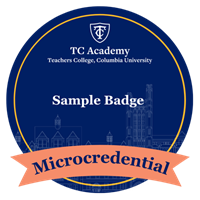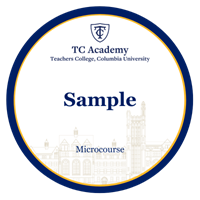Research-Based Literacy Instruction Microcredential
The Science of Word Reading and Reading Fluency

Program Description:
Unlock the Power of Early Literacy Instruction
Enhance your K-6 teaching with our three-part microcredential designed to elevate your impact in the classroom. This comprehensive program provides a research-backed, practical approach to early literacy instruction, with focused training in:
-
Word Reading – emphasizes the foundational science of word recognition
-
Fluency Development – addresses reading fluency as the crucial link between decoding and comprehension
-
Responsive Coaching – focuses on providing targeted, developmentally appropriate feedback
Enroll today and lead the way in early reading excellence! Microcourses 1 and 2 may be taken individually; microcourse 3 requires completion of microcourse 2. Badges and certificates of participation will be given for completion of each microcourse. To earn the microcredential, learners must complete all three microcourse. Cost is $125 for each microcourse, or $325 for the full microcredential.
Microcourse 1: The Science of Word Reading: Assessment and Instruction for Early Literacy
Microcourse 1 emphasizes the foundational science of word recognition, exploring key components such as phonological awareness, phonics, decoding, and sight word recognition. It offers practical assessment tools and structured instructional strategies to help educators identify students' specific needs and design small group lessons that promote accuracy and automaticity in word reading, setting the stage for fluency and comprehension.
Microcourse 2: Fluency Fundamentals: Building the Bridge to Comprehension
Microcourse 2 builds on this foundation by addressing reading fluency as the crucial link between decoding and comprehension. It covers the multidimensional nature of fluency—including accuracy, rate, and prosody—and provides assessment tools and targeted instructional strategies for diverse learners. Educators learn to implement efficient fluency practices within whole-class or small-group settings to enhance students’ expressive and meaningful reading.
Microcourse 3: Assessing and Coaching Reading Fluency: Providing Targeted Feedback and Next Steps
Microcourse 3 extends fluency instruction into responsive coaching, teaching participants how to observe and analyze student reading through multiple lenses and provide targeted, developmentally appropriate feedback. This microcourse focuses on applying fluency knowledge in real-time to support readers at various stages, ensuring instruction is tailored to each student’s needs and advancing their reading growth effectively.





